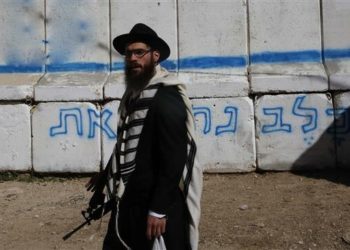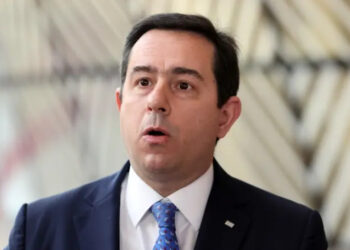A day after Turkey rounded up hundreds of Islamic State suspects in one of the most sweeping raids against the group’s far-reaching network across the country, President Donald Trump praised the Turkish efforts to combat ISIS in a first talk with his Turkish counterpart since he took office.
President Trump reiterated “U.S. support to Turkey as a strategic partner and NATO ally”, and offered a glowing praise to its ally for its contributions to the fight against ISIS. He also spoke about the two countries’ “shared commitment to combating terrorism in all its forms,” a White House statement said on Tuesday.
It took almost three weeks for the first contact between President Trump and his Turkish counterpart since inauguration of the American president in January. And it came amid such a time when the U.S. President waded into political firestorm, sparking upheaval and chaos at home and abroad after he placed a ban on migrants, and travelers from seven Muslim countries, prompting a federal court to overturn his decision two days ago.
His policies reverberated across the region, igniting backlash from countries such as Iran and Iraq, which has adopted a ‘reciprocity measure’ against Americans entering the country, if the U.S. administration does not rescind the immigration ban. The Iraqi retaliatory move put U.S. efforts to defeat ISIS in jeopardy since American military has been cooperating with the Iraqi troops against the extremist militants in years-long campaign.
Mr. Trump’s immigration ban, or Muslim ban, has generated controversy and reaction across the world, inflaming stokes of anti-American sentiment throughout the Middle East. But not in Turkey. President Recep Tayyip Erdogan avoided to criticize the new American president for his urgent political needs at home and for the expectation that two leaders may produce a fresh re-start in soured relationship.
Pro-government Daily Sabah praised the 45-minute talk as a productive and lengthy conversation between two leaders, citing Turkish diplomats in Ankara. A statement from press office of the Turkish presidency underlined long history of close ties between two countries and said the Turkish president wished success to Mr. Trump during his term at the Oval Office.
But neither White House nor the statement from the Turkish presidency delve into details of Tuesday call except only stressing the mutual determination to fight against terrorism in “all its forms.” Despite the brevity of the statement, Mr. Trump’s praise for Turkey’s efforts in the fight against ISIS may well offer a psychological boost to Mr. Erdogan who faces a critical referendum this April.
But there was no explanation on other issues that the Turkish side expected to bring during the long anticipated talk. Mr. Erdogan’s Turkey has lots of expectations from the new Trump administration and any progress on strained ties depend on how White House would meet the diverse Turkish demands.
Among them is Ankara’s call to the Trump White House to revisit its relationship with Syrian Kurdish militia, which is the most reliable U.S. ally on the ground in Syria in anti-ISIS fight, and it emerges at the center of U.S. plans to retake ISIS stronghold Raqqa in upcoming months. For observers of Turkey and U.S., it is prescient to say that the U.S. cannot simply meet this demand due to geopolitical facts and military considerations on the ground.
While Mr. Trump’s ascent to White House triggered an euphoric mood in Ankara, caution steadily reined in given complex nature of demands and political realities in place. Another potential contentious issue is extradition of U.S.-based Islamic cleric Fethullah Gulen whom Ankara accuses of leading the summer putsch last year. Ankara is enraged over persistent U.S. demand for proof over Gulen’s involvement in the coup before extradition.
The July 15 insurrection was decisively defeated by Mr. Erdogan’s government, which later unleashed a still ongoing clampdown on opponents of all sort, real and imagined, and made purge of suspected Gulen sympathizers among public servants cardinal element of its policy.
It was Mr. Trump’s praise of President Erdogan in positive terms over his bold stance in the face of failed coup that led to turnaround in feelings of Turkish authorities against then-Republican candidate.
In an interview with the New York Times last year, Mr. Trump refused to condemn Mr. Erdogan’s scorch-earth policies against opponents, mass arrests and sweeping purge campaign. “I think it’s very hard for us to get involved in other countries when we don’t know what we are doing and we can’t see straight in our own country,” he told the Times.
Since then, Mr. Trump emerged as favorite choice of Ankara over Democrat candidate Hillary Clinton whose disdain for the increasingly authoritarian Turkish leader was well-known to diplomats and journalists. Even, during convulsive time ushered in by immigration ban, pro-Erdogan media and the Turkish president himself declined to criticize Mr. Trump for the controversial move, which was mostly regarded as a ban on Muslims.
The Tuesday talk may provide Mr. Erdogan some scores to refer during his domestic campaign to promote ‘Yes’ vote for the referendum, which envisages a strong executive presidency. The praise of Turkey’s role and contribution to the fight against ISIS palpably qualifies as one of them. Turkey has recently stepped up its efforts to dismantle ISIS networks across the country in a bid to degrade its operational capability after a series of deadly bombing attacks plunged the nation into tumult and chaos.
“They are trying to highlight the issues of common interests, which aren’t that many, which is why they mention the Islamic State,” Rodger Shanahan, a research fellow at Sydney’s Lowy Institute, told CNN. He said there are lots of areas that went unmentioned in the readout of the conversation.
For him, Mr. Trump relies on the Turkish cooperation if he pushes forward with his safe zone plans in Syria. Ankara has long pressed for formation of safe zones in northern Syria to accommodate refugees, but its pleas went unanswered for years. CIA Director Mike Pompeo’s visit to Turkey this Thursday takes new meaning in this context. Syria, safe zone plans and anti-ISIS cooperation are topics that CIA director would discuss with Turkish officials during his first foreign visit.
The readout also fails to mention anything about Turkey’s domestic affairs or does not contain any urge for the Turkish president to respect democracy or human rights, core pillars of a healthy democracy that only worsened during state of emergency in Turkey.
Such refraining is what Mr. Erdogan long sought, dreaming a form of relations free of any moral assessment or criticism of each other’s domestic politics. Turkey’s authorities in general, and Mr. Erdogan in particular, do not want to hear even a hint of criticism from its Western allies, especially the U.S. And Mr. Trump who rejects to take a moral stance in relations with allies and foes may deliver what the Turkish leadership seeks: No moral charges or criticism.






















